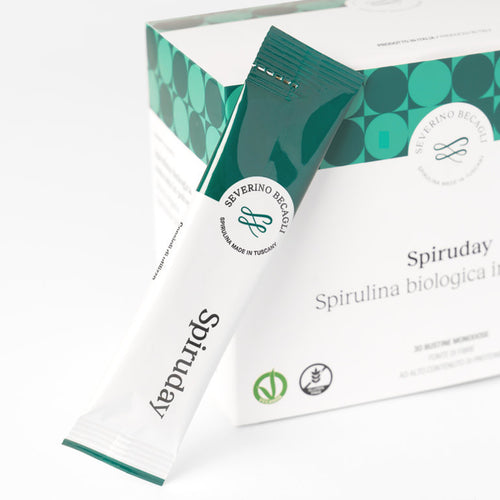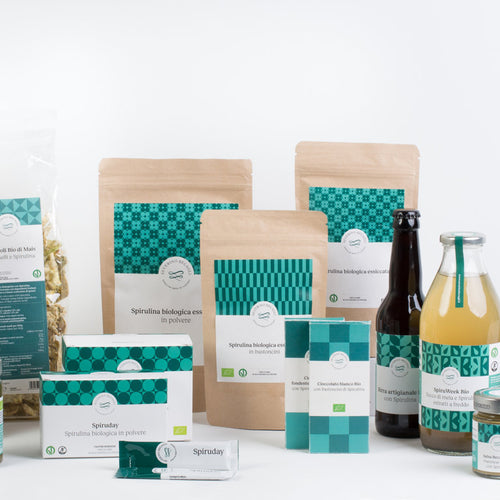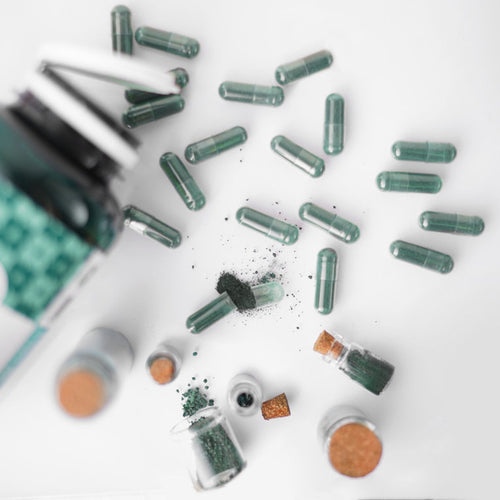Let's now see exactly what spirulina algae is and what its advantages are.
What is spirulina algae
Spirulina (Arthrospira Platensis) is a unicellular cyanobacterium found in freshwater lakes in the tropical or subtropical area, but is commonly and incorrectly defined as an alga. It has a dark green color because it contains chlorophyll and is called "spirulina" due to its spiral shape, visible only under the microscope given that its dimensions are very small .
Spirulina represents the evolutionary bridge between bacteria and plants, between the world of algae and the plant world, and was fundamental for the evolution of the human species itself. It has been eaten as a food for a very long time, already the Aztec populations of the Mexico area used it, as did the African populations residing in the Lake Chad area, and now it is used all over the world, especially in the United States and the Far East .
Spirulina can be purchased both in the form of food and as a supplement and is used above all by those who follow a vegan diet or have nutritional deficiencies, because it contains a lot of vegetable proteins. It is considered a "super food" and is in great demand due to its countless beneficial properties.
All the benefits of spirulina algae
Spirulina can commonly be found on the market in the form of capsules, tablets, or powder and is a valid ally for those who need to integrate vitamins or proteins into their diet. We at Severino Becagli only produce the capsule or powder formats because they are the purest formats, in fact the tablets are made with the addition of chemical thickeners which alter their quality.
This microalgae can also benefit our well-being for other reasons, let's see them below.
- It fights aging and purifies our body.
-
It has an antioxidant effect. Vitamins, phycobilins and other pigments such as chlorophyll help our body stay energetic and healthy. In practical terms it can promote concentration and helps protect the body, as well as helping to combat free radicals.
-
It is of enormous help for those who have nutritional deficiencies or follow a vegan diet. Spirulina is made up of 70% easily assimilable vegetable proteins, and contains all the essential amino acids necessary to integrate a vegan or vegetarian diet, which therefore does not include meat, fish or dairy products.
-
It is rich in omega-6 and gamma linolenic acid, which is why it helps in the prevention of cardiovascular diseases. It also helps improve cholesterol and triglyceride levels in the blood, in addition to the fact that it can stabilize blood pressure. Thanks to the presence of beta-carotene, it helps protect the body exposed to excessive ultraviolet rays and from oxidative stress.
- It is a valid ally for all athletes who practice intense physical activity. This is because inside we find a large quantity of easily assimilable vegetable proteins, vitamins and mineral salts such as potassium and magnesium, which help in muscle recovery and give energy to our body
- Thanks to the presence of antioxidants and vitamins, spirulina algae is important for improving the immune system and for combating allergic diseases, such as rhinitis, hay fever, or combating hypertension and hyperlipoproteinemia.
The properties of spirulina
We have mentioned the beneficial properties of spirulina several times, let's now analyze them more specifically to understand what it is.
- It is rich in vegetable proteins which can be introduced into a well-balanced vegetarian or vegan diet and help to achieve a sense of satiety earlier during a meal, so as not to binge. In this case, we recommend taking spirulina about 30 minutes before lunch to activate the metabolism.
- Contains vitamins and mineral salts, which help on a mental level and concentration. Furthermore, given that spirulina grows in fresh water, it is iodine-free and is therefore also suitable for those with thyroid problems.
-
It has all the essential amino acids, omega 6 and omega 3 which help fight bad cholesterol, but also the vitamins of groups A, D, E and K and those of group B which act as an antioxidant.
- It contains a good dose of iron, which is why it is also recommended for anaemics. The iron present in spirulina is much more digestible than the classic iron found on the market in other supplements, therefore excellent for those who often have side effects due to ferritin.
Spirulina: supplement and recommended doses
Spirulina is a food that we recommend taking daily, even for long periods. The ideal dose of spirulina, for a person with normal physical activity, to take every day is 3 grams (the quantity present in a sachet of Spiruday Becagli), and it is the quantity needed to cover the daily requirement of various nutrients . Obviously spirulina should not be taken as a meal replacement, but should be considered as a supplement within a regular or low-calorie diet.
In case of intense sporting activity you can take up to 10 grams of dried spirulina in powder or capsules, in which case it is necessary to drink a lot of water to avoid compromising kidney function.
Usually a spirulina supplement, such as our Spiruday or Spirucap, should be taken at breakfast to ensure energy or before meals to increase the sense of satiety, so as to allow us to eat the right calories for lunch or dinner.
The advice is to take spirulina in cycles, perhaps considering 3 months of intake and a break, so as not to accustom and accustom our body too much by reducing the beneficial effects of the algae.
Spirulina in the kitchen
Spirulina is a natural food and therefore has a very specific flavor. Its taste is considered "umami", one of the 5 fundamental tastes that are perceived by the receptor cells of our human oral cavity. Its flavor is strong and recalls that of dried mushrooms, glutamate, or pumpkin seeds. Although it may seem very intense when taken alone, spirulina does not cover the flavor of the other ingredients it is mixed with. In the kitchen, seaweed dried at low temperatures is used, so as to preserve all the vitamins that are present, so as not to lose their properties.
When we buy it, however, it is essential to pay attention to where and how it was produced, so that it is pure and organic. We always recommend choosing a spirulina from Italian or European agriculture and certified organic, such as Spirulina Becagli.
In the kitchen we can use it to create new dishes, it's not difficult. It can be used for example in doughs to make pasta or bread, focaccia but also biscuits or various baked goods. We can also use it as an addition to salads or to make vegetables tastier. It can also be added to soups or soups at the end of cooking, so as not to lose its properties.
Furthermore, spirulina is perfect for breakfast to add to smoothies and energy juices with products that enhance its properties, such as lemon or ginger, or coconut milk and banana.
Spirulina in sport
We have mentioned how much spirulina is used by athletes, but why? Why is it so important for those who practice physical activity? Spirulina is considered a "super food" for its concentration of vitamins, proteins and mineral salts which help increase body energy and the general well-being of the body. This is fundamental for an athlete given the many physical efforts needed to achieve concrete results. The vegetable proteins we find in this algae are of excellent quality and it is also rich in vitamin A which helps to renew tissues and cells. This means that spirulina helps build and maintain muscle mass, also because it is rich in calcium and magnesium which are excellent for the proper functioning of muscles. Athletes must integrate a lot of proteins and follow a specific diet to obtain excellent results, otherwise they would not be able to have a large muscle mass. This seaweed is a natural supplement and therefore excellent to take daily.
Spirulina algae: Contraindications and risks
Although it has many beneficial effects, spirulina may have contraindications in some cases. In fact, in 2018 an information sheet was created on possible risks, after Anses, the French food safety agency, received reports from people who had taken it and had had side effects. This is because spirulina must be taken in certain doses, without exaggerating (remember 10 grams per day only in cases of intense physical effort, otherwise 3 to 5 grams per day are sufficient), furthermore if you choose a low quality spirulina it may contain cyanotoxins , bacteria and traces of heavy metals. For this reason it is essential to check the place where it was grown, preferring Italian agriculture, and verifying that it is certified organic. If it is not grown in closed and controlled greenhouses, as we do in Severino Becagli, it can absorb substances harmful to the body and induce allergies of various kinds.
Instead, particular attention in any case must be paid by those suffering from phenylketonuria, in this case the use of spirulina is not recommended.
The European Food Safety Authority (EFSA) has recognized spirulina as a food and therefore it has been approved that there is no health risk. The important thing is not to abuse it, therefore respect the instructions, take only the recommended doses, and purchase it only from those who guarantee high-level quality and production standards.
In any case, in particular health situations, our advice is always to consult your trusted doctor or nutritionist.
Spirulina algae and diet
As we have seen, this algae can really provide various benefits to our body, in particular to the immune system. Spirulina is not a magic potion that makes you lose weight, but it can help in the slimming process, it helps block the feeling of hunger so that we eat less naturally. To lose a lot of weight we must dedicate ourselves to sport constantly, doing cardio or weight training, always integrating a diet tailor-made for us. In fact, the first thing to do to lose weight is to contact a nutritionist and integrate spirulina into our diet . Spirulina algae will therefore be an extra piece that will help you achieve your goals sooner, but above all it will help you stay healthy and take care of yourself.







